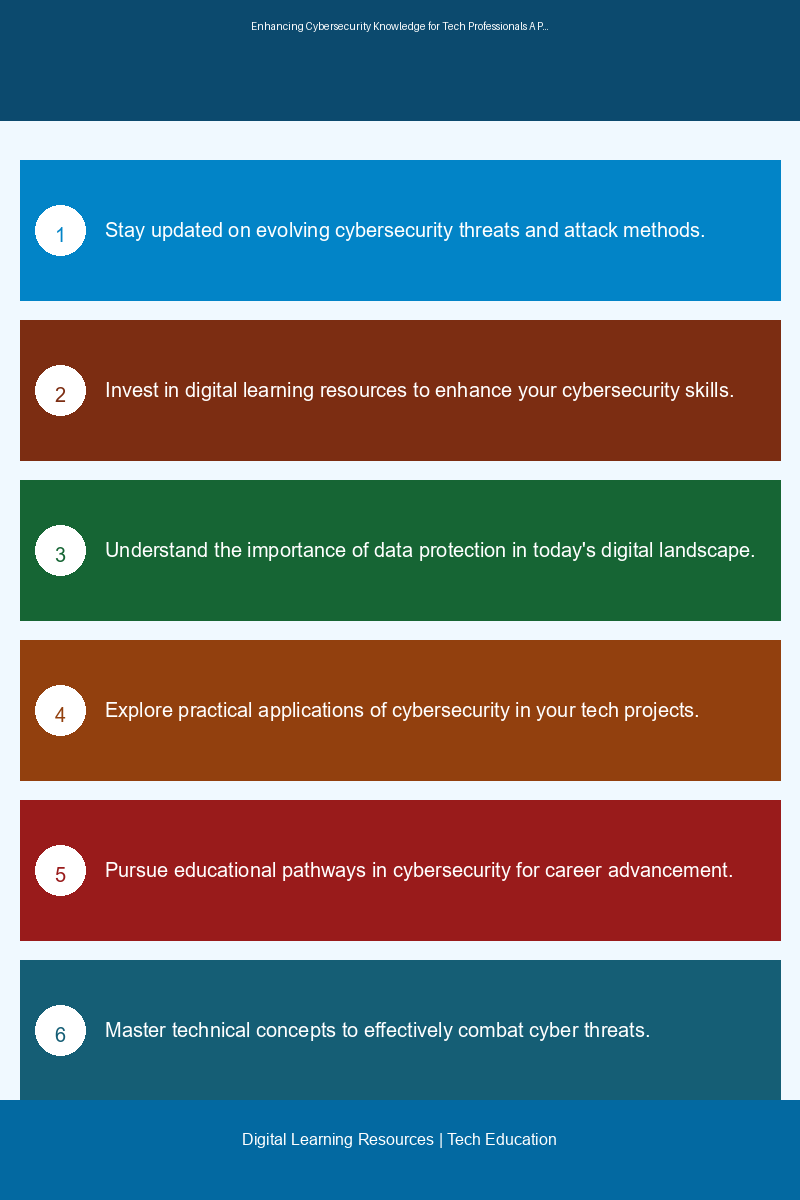Key Takeaways:
Cybersecurity is a critical area for data protection, with evolving threats and sophisticated attack methods. This blog post explores the technical aspects of cybersecurity, practical applications, learning paths, and industry trends to equip tech professionals with the necessary skills for a secure future.
Introduction
In today’s digital landscape, where data breaches and cyberattacks are commonplace, understanding the intricacies of cybersecurity is more critical than ever. As cyber threats evolve and become more sophisticated, IT professionals, developers, and tech learners must arm themselves with the knowledge and skills needed to combat these challenges. This post will delve into the technical concepts surrounding cybersecurity, explore practical applications, recommend educational pathways, and discuss the career implications of mastering this field.
Technical Background and Context
Cybersecurity aims to protect systems, networks, and data from digital attacks. As the sophistication of cyberattacks increases, so do the methods employed by attackers:
📚 Recommended Digital Learning Resources
Take your skills to the next level with these curated digital products:
AI Enhanced Resume Builder
AI Resume Builder Flask App – Complete Source Code + PDF Tutorial + HTML | Digital Download for Designers
Learn AWS: Your First Cloud Application
Learn AWS: Your First Cloud Application
📊 Key Learning Points Infographic

Visual summary of key concepts and actionable insights
Comprehensive SAT Prep: 470+ Vocabulary Words
Comprehensive SAT Prep: 470+ Vocabulary Words
Master DevOps in Practice – 50 Essential Topics for Engineers (PDF eBook)
Master DevOps in Practice – 50 Essential Topics for Engineers (PDF eBook)
The Ultimate Keyboard Shortcut Guide 49 Software Cheat Sheets in One PDF Bundle
The Ultimate Keyboard Shortcut Guide 49 Software Cheat Sheets in One PDF Bundle
- Cybersecurity as a Critical Objective: Protecting sensitive data is paramount for organizations, and cybersecurity serves as the first line of defense.
- Attack Vectors: Attackers utilize various vectors such as malware, ransomware, and DDoS attacks to infiltrate systems. Each method presents unique challenges and requires specific countermeasures.
- Combination of Techniques: Many attacks use a combination of methods—for instance, a phishing email may deliver ransomware, showcasing the need for comprehensive security awareness.
- Supply Chain Attacks: These attacks target the integrity of products and services, emphasizing the importance of securing not just internal systems but also third-party vendors.
Practical Applications and Use Cases
Understanding cybersecurity concepts is crucial for practical implementation. Here are some use cases:
- Malware Defense: Implementing antivirus software and regular updates can mitigate the risks associated with malware.
- Ransomware Preparedness: Regular backups and employee training on recognizing phishing attempts can minimize the impact of ransomware attacks.
- DDoS Mitigation: Using load balancers and rate limiting can help absorb or redirect traffic during DDoS attacks.
- Supply Chain Security: Conducting risk assessments and audits on third-party vendors can strengthen supply chain security.
Learning Path Recommendations
To enhance your cybersecurity knowledge and skills, consider enrolling in the following educational opportunities:
- Online Courses: Many platforms offer courses led by industry experts, covering topics from basic cybersecurity principles to advanced threat detection.
- Certifications: Pursuing certifications such as CompTIA Security+, Certified Ethical Hacker (CEH), or Certified Information Systems Security Professional (CISSP) can validate your skills and knowledge in cybersecurity.
- Workshops and Webinars: Participate in hands-on workshops and webinars that focus on current cybersecurity trends and tools.
Industry Impact and Career Implications
The increasing complexity and sophistication of digital threats have profound implications for the industry:
- Target Diversification: Attacks are no longer confined to large corporations; smaller businesses, healthcare organizations, and individuals are now prime targets.
- Nation-State Involvement: The rise of cyber warfare and espionage by nation-state actors underscores the need for robust cybersecurity measures.
- Supply Chain Vulnerabilities: The prevalence of supply chain attacks necessitates comprehensive security strategies that encompass all aspects of an organization.
For tech professionals, this evolving landscape presents both challenges and opportunities. By developing cybersecurity skills, you position yourself as an invaluable asset in any organization, leading to career advancement and new opportunities.
Implementation Tips and Best Practices
To effectively implement cybersecurity measures in your organization, consider the following best practices:
- Regular Security Audits: Conduct security audits to identify vulnerabilities and ensure compliance with cybersecurity standards.
- Employee Training: Regularly train employees on cybersecurity best practices, emphasizing the importance of recognizing phishing attacks and adhering to security protocols.
- Incident Response Plans: Develop and maintain an incident response plan to ensure a timely and effective reaction to potential breaches.
- Utilize Security Tools: Employ security tools such as firewalls, intrusion detection systems, and endpoint protection solutions to bolster your defense.
Future Trends and Skill Requirements
As the cybersecurity landscape continues to evolve, staying ahead of trends and skill requirements is crucial:
- AI and Machine Learning: Familiarity with AI-driven security tools will become increasingly important as they are used to detect and respond to threats.
- Zero Trust Architecture: Understanding the principles of zero trust will be essential as organizations move towards more stringent access controls.
- Cloud Security: With the rise of cloud computing, knowledge of cloud security practices and tools will be critical.
Conclusion with Actionable Next Steps
As cyber threats continue to rise in sophistication, the importance of cybersecurity in protecting data cannot be overstated. For tech professionals looking to enhance their skills in this crucial area, the following actionable steps are recommended:
- Enroll in a cybersecurity course or certification program to deepen your knowledge.
- Stay informed about current cybersecurity trends and emerging threats through reputable tech news sources.
- Join online communities or forums to share knowledge and learn from industry peers.
- Implement practical security measures in your current role to enhance your organization’s cybersecurity posture.
By proactively investing in your cybersecurity education and skills, you position yourself for success in an ever-evolving digital world.
Disclaimer: The information in this article has been gathered from various reputed sources in the public domain. While we strive for accuracy, readers are advised to verify information independently and consult with professionals for specific technical implementations.
Ready to advance your tech career? Explore our digital learning resources including programming guides, certification prep materials, and productivity tools designed by industry experts.



